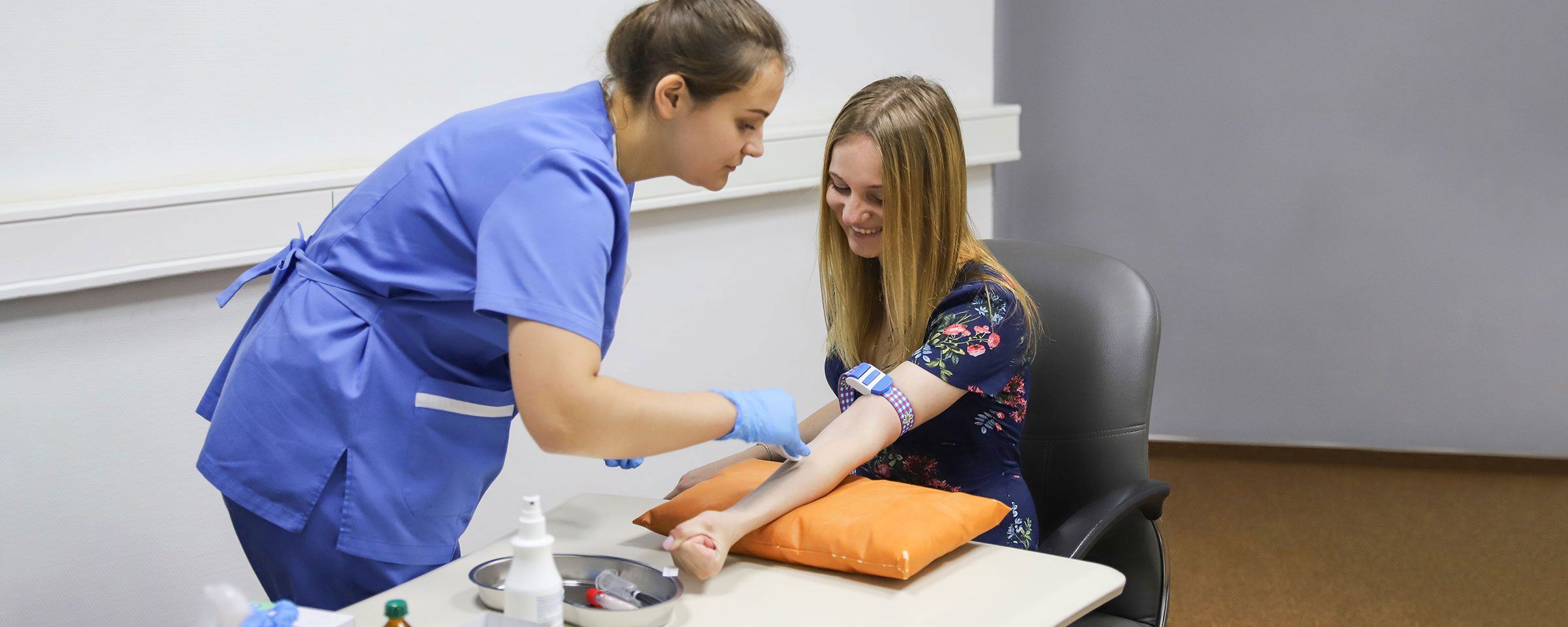


NOTE: This program is exclusively available to Indigenous individuals belonging to one of the 23 First Nation communities that Keewatinohk Inniniw Minoayawin supports.
Only applicants who meet the criteria and are sponsored by Keewatinohk Inniniw Minoayawin Inc. are eligible to apply for this program. See below for information on how to apply.
RRC Polytech has partnered with Keewatinohk Inniniw Minoayawin Inc. to offer the Diagnostic Support Worker (DSW) program, which prepares students to practice diagnostic support skills as knowledgeable, competent and caring health care professionals.
It is an applied certificate program designed to enhance the accessibility to health care services for remote communities. Focused in community, students are provided with the opportunity to learn and practice clinical skills close to home.
The program is comprised of four groups of micro-credentials courses, with a combined four micro-credentials available to be awarded (as digital badges):

Learn more about RRC Polytech micro-credentials >
The DSW program offers a blend of online, in-class lab and clinical learning experiences.
Learning methods include:
You will:
You may be able to work in a health centre with only two complete micro-credentials: 1) Academic Foundations (required) and 2) ECG, Phlebotomy or Radiographic Procedures. For example, completion of Academic Foundations and all three courses in the ECG micro-credential means you can safely practice ECG for employment. You can only practice micro-credentials that you have completed.
NOTE: Depending on your home community, you may need to relocate – 1-2 weeks for labs and either 1-2 weeks or 2-3 months for clinical.
The Academic Foundations micro-credential consists of four courses to give you information that is important to learn before the other specific micro-credentials.
Once you have completed these courses, additional groups of micro-credential courses can be taken one, two or all three at a time: ECG, Phlebotomy and Radiographic Procedures. Note that course sections will be offered at specific times.
Three courses must be completed in sequence to earn this micro-credential:
Three courses must be completed in sequence to earn this micro-credential:
Three courses must be completed in sequence to earn this micro-credential:
Students will earn a micro-credential in the form of a shareable digital badge for successfully completing each of the ECG, Phlebotomy and Radiographic Procedures groups of micro-credential courses, as well as the DSW Applied Certificate for successfully completing all four.
| Overview | Dates | Courses |
| Student Assessment and Recruitment | May – August 2024 | N/A |
| Term 1 – 15 Weeks, Online Delivery | August – December 2024 | Professional Practice and Communication, Academic Foundations, Anatomy & Medical Terminology |
| Term 2 – 15 Weeks, Online Delivery | January – April 2025 | Safety in Health Care, Phlebotomy Theory, ECG Theory, Radiographic Tech Theory |
| Skill Labs, 2 Weeks (Location TBD) | May 2025 | Phlebotomy Lab, ECG Lab, Radiographic Tech Lab |
| Clinical, 14 Weeks (Location TBD) | June 2025 onwards | Phlebotomy Clinical, ECG Clinical, Radiographic Tech Clinical |
| Program Graduation | October 2025 | N/A |
NOTE: This program is exclusively available to Indigenous individuals belonging to one of the 23 First Nation communities that Keewatinohk Inniniw Minoayawin supports.
Only applicants who meet the above criteria and are sponsored by Keewatinohk Inniniw Minoayawin Inc. are eligible to apply for this program.
Have a question or ready to apply to the program while seats are still available?

RRC Polytech campuses are located on the lands of Anishinaabe, Ininiwak, Anishininew, Dakota, and Dené, and the National Homeland of the Red River Métis.
We recognize and honour Treaty 3 Territory Shoal Lake 40 First Nation, the source of Winnipeg’s clean drinking water. In addition, we acknowledge Treaty Territories which provide us with access to electricity we use in both our personal and professional lives.